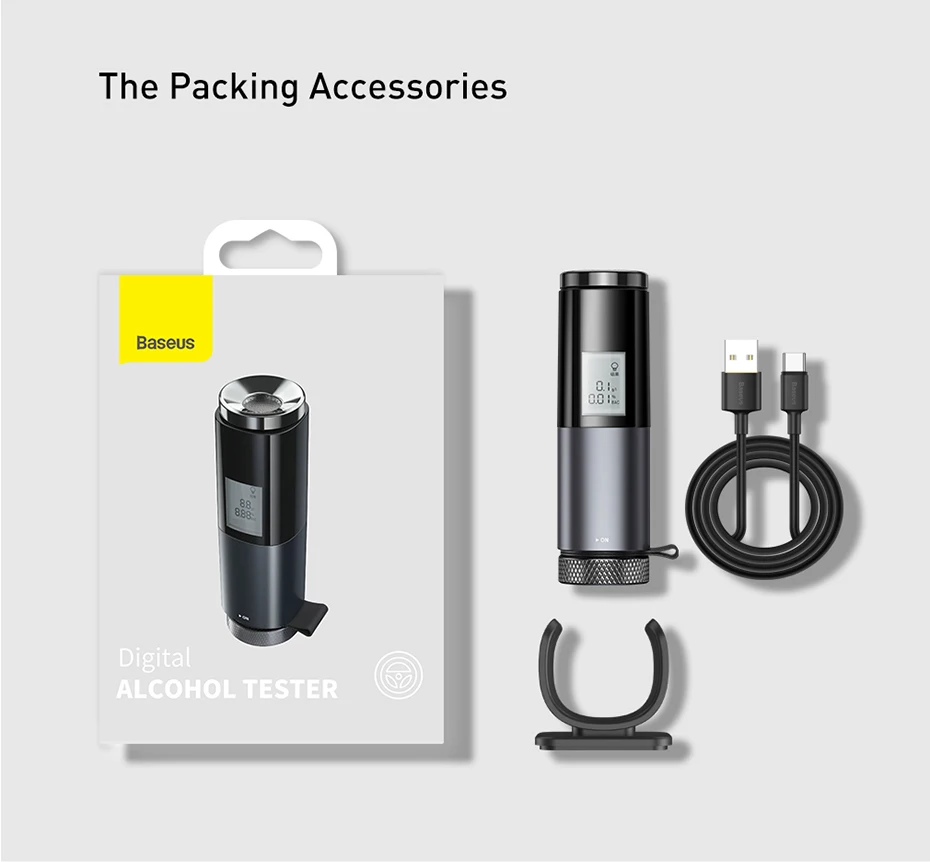

































Breathalyzer - Automatic Alcohol Tester
- $50.00 USD
$79.99 USD- $50.00 USD
- Unit price
- per
Free shipping on All Orders. No Minimum Purchase


































According to the World Health Organization (WHO), approximately 1.35 million people die each year as a result of road traffic crashes. While not all of these fatalities are directly attributed to drunk driving, alcohol is a major contributing factor in many accidents.
The Global Status Report on Road Safety 2018 by WHO states that alcohol is involved in about 29% of all road traffic fatalities globally. This figure can vary significantly by region and country due to differences in alcohol consumption patterns, enforcement of laws, and infrastructure.
It's essential to continue efforts to combat drunk driving through measures such as strict enforcement of blood alcohol concentration (BAC) limits, public awareness campaigns, improved road safety infrastructure, and education on the dangers of driving under the influence.
Breathalyzers can save lives in several ways:
1. Prevention of Drunk Driving : Breathalyzers provide an immediate and objective measure of a person's blood alcohol concentration (BAC). By testing individuals before they get behind the wheel, breathalyzers can deter drunk driving by discouraging individuals from driving if they are over the legal limit.
2. Identification of Impaired Drivers : Law enforcement officers use breathalyzers to quickly and accurately assess whether a driver is under the influence of alcohol. This enables them to remove impaired drivers from the road, reducing the risk of accidents and potential fatalities.
3. Early Intervention: In settings such as bars, clubs, and social events, breathalyzers can be used as a proactive measure to encourage responsible drinking. Individuals can use breathalyzers to monitor their own alcohol consumption and make informed decisions about whether they are safe to drive.
4. Public Awareness and Education : The presence of breathalyzers in public spaces raises awareness about the dangers of drunk driving and promotes responsible alcohol consumption. It sends a powerful message that impaired driving is not tolerated and encourages individuals to plan for alternative transportation if they have been drinking.
5. Enforcement of DUI Laws : Breathalyzer results serve as crucial evidence in prosecuting drunk driving cases. By providing objective proof of impairment, breathalyzers strengthen the enforcement of DUI laws and hold offenders accountable for their actions.
5. Reduction of Traffic Fatalities : Studies have shown that the widespread use of breathalyzers is associated with a decrease in alcohol-related traffic fatalities. By deterring drunk driving and removing impaired drivers from the road, breathalyzers contribute to saving lives and reducing the overall incidence of traffic accidents.
6. Support for Designated Driver Programs : Breathalyzers can support designated driver programs by empowering individuals to monitor their own sobriety and take on the role of a sober driver when necessary. This promotes a culture of responsibility and encourages safer choices when alcohol is involved.


Efficient Chip, Accurate Testing
A smart chip and high-sensitive sensor offer stable and anti-interference performance for accurate testing. In settings such as bars, clubs, and social events, breathalyzers can be used as a proactive measure to encourage responsible drinking. Individuals can use breathalyzers to monitor their own alcohol consumption and make informed decisions about whether they are safe to drive.

Scientific Filter, More Accurate Testing
A filter compartment can filter substances except for alcohol for more reliable and accurate testing.

LED Display, Clear Readings
A high-contrast LED display screen is easy to read with values in two units.

DUI Reminder, Light/Beep Warning
Different indicator lights will turn on according to the content of alcohol. If overdrink, the beep will sound.
Pass: green light on
Drank: yellow light on with beeps
Drunk: red light on with beeps

Charge Once and Use for 3 Months
A large capacity lithium battery can be used for 3 months after fully charged.







Thanks for subscribing!
This email has been registered!

| Product | SKU | Description | Collection | Availability | Product Type | Other Details |
|---|